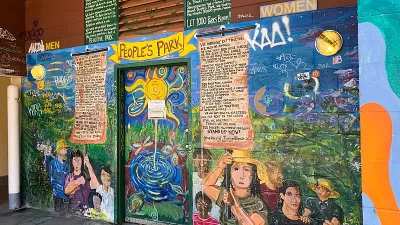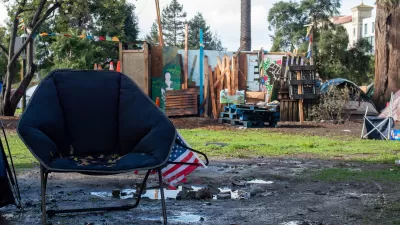The University of California, Berkeley faced bitter opposition to new student housing. What does this mean for universities—and for democracy?

In an op-ed for MinnPost republished in Next City, Zak Yudhishthu outlines what the city of Berkeley could learn from its contentious fight over student housing in People’s Park.
“Residents of the city wanted to see UC Berkeley reduce its admission size, arguing that the students were an environmental nuisance which the city did not have room to house.” While the university won out in this case, a state court ruling means future students will be considered an environmental impact due to potential noise.
Yudhishthu compares the situation to St. Paul, where a similar debate over student housing happened in the 2000s and again in 2012. For Yudhishthu, “In an immediate sense, the refusal to let our higher education systems grow is a destructive tendency. When colleges can’t grow, the students of tomorrow face a world with less choice and greater competition for existing slots.”
Yudhishthu points out that opposition to student housing often goes hand in hand with other exclusionary policies such as single-family zoning. “This is no healthy way to cohabitate in our cities and towns. Successful communities shouldn’t be defined by keeping people out, but by welcoming newcomers and incorporating them into civic life.”
FULL STORY: What Berkeley Can Learn From This Historic Fight Over Student Housing

Alabama: Trump Terminates Settlements for Black Communities Harmed By Raw Sewage
Trump deemed the landmark civil rights agreement “illegal DEI and environmental justice policy.”

Planetizen Federal Action Tracker
A weekly monitor of how Trump’s orders and actions are impacting planners and planning in America.

The 120 Year Old Tiny Home Villages That Sheltered San Francisco’s Earthquake Refugees
More than a century ago, San Francisco mobilized to house thousands of residents displaced by the 1906 earthquake. Could their strategy offer a model for the present?

In Both Crashes and Crime, Public Transportation is Far Safer than Driving
Contrary to popular assumptions, public transportation has far lower crash and crime rates than automobile travel. For safer communities, improve and encourage transit travel.

Report: Zoning Reforms Should Complement Nashville’s Ambitious Transit Plan
Without reform, restrictive zoning codes will limit the impact of the city’s planned transit expansion and could exclude some of the residents who depend on transit the most.

Judge Orders Release of Frozen IRA, IIJA Funding
The decision is a victory for environmental groups who charged that freezing funds for critical infrastructure and disaster response programs caused “real and irreparable harm” to communities.
Urban Design for Planners 1: Software Tools
This six-course series explores essential urban design concepts using open source software and equips planners with the tools they need to participate fully in the urban design process.
Planning for Universal Design
Learn the tools for implementing Universal Design in planning regulations.
Clanton & Associates, Inc.
Jessamine County Fiscal Court
Institute for Housing and Urban Development Studies (IHS)
City of Grandview
Harvard GSD Executive Education
Toledo-Lucas County Plan Commissions
Salt Lake City
NYU Wagner Graduate School of Public Service





























